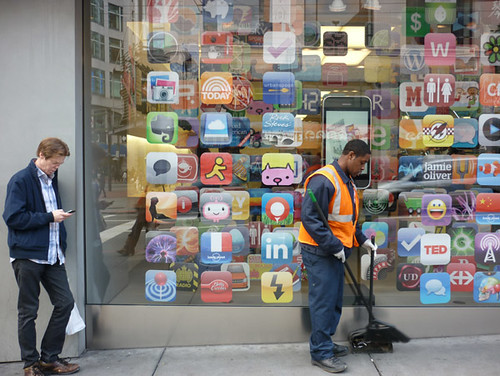
Just in time for the unfurling of Google's mysterious barge, a 50-foot-tall, 250-foot-long shipping container structure that looks to be a sort of floating technology theme park, I thought I'd post some excerpts from a fascinating dialog this summer between several Google employees about their differing worldviews. The full discussion is posted here through the eyes of Kuku Mon, one of the participants who first contacted me after I wrote What's the Matter with the Google Bus and whom I've had several thought-provoking email exchanges with since.
And just as there are those who try to measure happiness with a formula, there are also those who measure progress by the sheer number of years lived.A couple of notes first:- Kuku Mon
- I'm using Google as the main protagonist because it's probably the most visible, powerful and wealthy representative of the Silicon Valley Tech Complex, and also the one most openly claiming to make the world a better place. Just as there are about 40 other companies shuttling their employees from SF to Silicon Valley in exclusive luxury buses, Google is not the only tech company in pursuit of remaking society while turning their founders and executives into gazillionaires. In a way, Google just functions as a symbol for Silicon Valley values that are ever more influential not only in our personal lives but in much broader cultural shifts as well as public policy decisions. My hunch though is that Kuku Mon's discussion with his colleagues could have taken place at any number of tech companies.
- I'm not anti-technology and not asking to go back to the stone ages (though I suppose Neanderthal bashes by the bonfire were a lot more fun than Google Hangouts or sharing Facebook updates at a meetup), but I find it important to take a critical look at that which we find ourselves engaged in almost non-stop these days and which is reshaping our communication and culture in drastic ways. Sure, humans have used technology since our ancestors first carved their stone chisels, but we've come a long way since and our tools are becoming ever more sophisticated in scope and impact on the planet. If we can't talk about the downsides of our total immersion into the world of screens and gadgets – like having to depend on (mostly fossil-fueled) electricity for almost every little thing we do, enjoying cheap and instant access to (mostly trivial) information on the backs of other people and at the expense of the environment in distant lands, and most of humanity turning into unhealthy couch potatoes, to name just a few – because we're using technology to do it, then we're even further along in becoming a pixel-worshipping borg than I thought.

"What you call need, I call suffering."The pivotal question, in my mind, is not so much whether the Googles, Facebooks, and Twitters of the world are providing valuable services, but whether their outsized presence in all aspects of modern life and the speed they are adding to consumption and all trans- and interactions while accruing fantastic wealth for themselves is helping to solve the world's most pressing problems. You know, the ones that really matter, like poverty, inequality, resource depletion, and climate change.Roshi Joan Halifax in response to Zynga Co-Founder Eric Schiermeyer, who insists that people need more information technology in order to further the evolution of human consciousness.
Moreover, I think it's fair to ask about the moral fabric of corporate entities with the mission to map every corner of the world, publish every word ever written, and extract every aspect of our personal lives for commercial purposes. Does this global, almost godlike sphere of influence dressed in do-good rhetoric come with a responsibility to engage in deeper philosophical discourse on what kind of society we're aspiring to be? Whether faster and bigger is always better and whether progress can be measured in algorithms?
I think it does, and that's why I relished the dialog between Kuku Mon and his colleagues. While most Silicon Valley titans may still be far from a Patagonia level of corporate self-reflection, there seems to be a genuine interest at least among some to look at growth from a more philanthropic angle, beyond IPOs, click rates, and quarterly profits, which I think is what we'll need to shift towards if we're serious about sustaining the human adventure on planet Earth into the foreseeable future. Reading A battle of worldviews gave me hope that instead of the world asking Is Google Making Us Stupid? Google might devote more of its energy to the question, "Are we making the world wiser?"
And if we at Google don't talk about these issues, who else will? The world listens to us. We have a tremendous responsibility to the planet that we exert so much influence on.- Kuku Mon

Is there an app for that?
The following are some of my favorite excerpts, with Kuku Mon's commentary in blockquotes and my responses below...